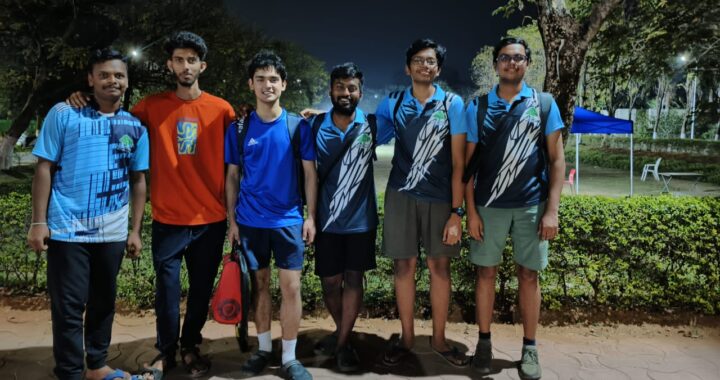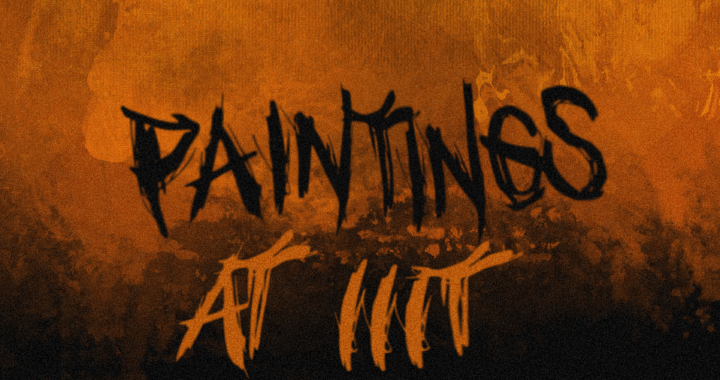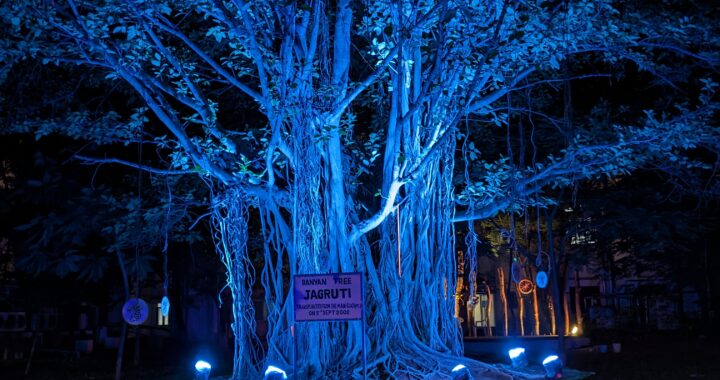Faculty Interview – Dr. Jayanthi Sivaswamy

Q: What is your inspiration?
A: I had never thought about being in academia while in school; the academic bug bit me when I was getting my Undergraduate degree. It was at that time when I thought I could be at no other place than academia! Apart from that, I had a very good Professor who said that the passport for academia is a Ph.D. So I did my Masters and got a Ph.D, just to be in academia. Currently I work in the area of image processing and medical screening. I have always been interested in computer and biological vision; and image processing is what you have to learn to get into it. I moved into medical because I thought it was an area where image processing can be of immense help, and can solve a lot of open problems.
Q: So when you were a B.Tech student, had you decided to be in image processing or this idea came later?
A: In B.Tech I didn’t know about image processing. Also, we didn’t have that many electives and image processing was not one of them. I took it up as a graduation student.
Q: How did you get into teaching?
A: I did my B.Tech in the US, so, I had to support myself and part of this support came from being a lab assistant. It was then that I discovered I liked teaching. And then during my Post Graduation I was a teaching assistant which gave me further exposure in teaching. But my family thinks that my teaching roots date back to when I was a young girl and played as a teacher! Add to that the fact that I come from a family of two Professors.
Q: Can you tell us something about your family?
A: My Grandfather was an English Professor, my Uncle is a retired Professor of Electrical Engineering and my brother-in-law is a Professor of Chemistry, so teaching has been there in the family. I come from a small family – one sister and one brother.
Q: What came first, marriage or Ph.D?
A: Definitely Ph.D (laughs)!
Q: You got your Ph.D back in 1992, how has the scenario changed since then? Is there a difference?
A: I don’t know if Ph.D has changed but I think there’s more change between places, the style of Ph.Ds that can come. Different universities have their own cultures, so from that point of view there is a change. I don’t know if Ph.D as such has changed. The emphasis on doing original research, getting publications and then earning a Ph.D has always been there. Because computing is playing bigger a role now and computing power now exists even in a cell-phone, so the kind of work you can do has changed. Still fundamentally I don’t think it has changed that much.
Q: What do you look forward to in student?
A: Curiosity, which I think is seriously lacking in most (laughs). A student should be willing to ask questions.
Q: Can you name a student who is the best you have worked with/guided?
A: That would be unfair. Different students impress me in different aspects. In research, original and more importantly, abstract thinking is the hardest. So students who are young and possess these qualities impress me. But having said that, coming up with ideas does not account for everything. This is not entrepreneurship where you come up with the idea and some VC will fund you. So there are students who are not that good at abstract thinking but will work hard and go the extra mile; they impress me equally. And of course, there are those in between.
Q: Which is the best project you have been involved in?
A: I love the project I am doing now. In New Zealand, I had already started some work on medical image processing, but when I arrived in India, I was serious about working with a hospital – the reason being that India has lots of problems and technology should be able to play a role. Currently, we are trying to develop screening solutions. We have a billion people and we need an efficient way to screen everybody in order to detect who is suffering from which disease and how each disease can be provided with appropriate medical care.
The first problem that I worked on was diabetes-related retinal diseases. Right now, I am working on glaucoma. It is a big problem as people don’t realize they have it until it’s very late. Although there’s no cure for it, if detected earlier, it can be controlled.
This is part of a screening project with a hospital in Madurai, which I love to work with. I spent an entire week with them once. Such an experience makes you realize the amount of difficulties they face. And then it makes you wonder what you can do to help them. I don’t know if we’ll get there, but we have to start.
Q: How do you manage to be the HOD of ECE even though you are an expert in CSE?
A: I’m not really a CS person as you put it. If you look at all my degrees, they have all been in the Electrical Engineering. I think students don’t understand that there are lots of intersection areas between disciplines. I happen to be in one of them. If you look at CVIT – of the four of us, two have an undergraduate degree and PhD. in Electronics (officially Electrical, because in US and other places it is also called Electrical).
Q: What is your take on ECE in IIIT-H — be it curriculum, resources or students?
A: ECE started late, in 2003. As is the trend, the latecomer has it hard. A problem we face is that IIIT-H already has an established program in CS and thus when people think of IIIT-H, they think of CS. Also, if you look at IIITs around in India, there aren’t any that offer a degree in ECE, like ours. In that way we’re unique. But that works against us in terms of hiring because good people don’t look at us. Even when companies come here, they think it is CS that dominates. It’s a chicken and egg problem we’ve been having. Since faculty members haven’t increased, we cannot increase the number of seats. But because the critical mass might not be building, the ECE program is not growing as fast as CSE program. If you look at the first two batches of ECE, where not much was known about the program, the students exhibited great enthusiasm and are currently pursuing PhD and doing very well. Due to a combination of lack of growth in number of faculty and we couldn’t build the program the way CS did, we haven’t seen the growth that is expected. In terms of the program though, I believe it’s better off than other institutes, like IITs in some aspects because we had a front runner like CSE. Like in CS, we decided to give as much hands-on experience as possible, to give students confidence and exposure. This means that although we haven’t seen as much success as CS, we do churn out better engineers in terms of practical exposure as compared to other institutions.
Q: What is your take on student’s mentality of changing a branch on the account of inferior placements?
A: The pressure is societal. For a long time in India, we’ve been stuck with this mentality that education is for earning. Most of us come from middle and upper middle class and the mentality is that one should be able to stand on his/her on two feet after college. Now with the IT boom, the expectations have become skewed: it’s not just employment, but employment at a very high earning rate.
Parents ask me the same questions in the interactive sessions, which I find sad. When I was your age, I had no clue of such things. Life just brings up these things along the way and you slowly do find your own niche. I mean there’s no guarantee, that the branch you’re changing to for better remuneration is the one you’ll still be in love with 3 years down the line. I can understand to some extent the frustration expressed by ECE students, regarding lack of hardware companies that show up for placements, which is valid. But even to that I say that not all ECE students will get placements in hardware companies because for a single piece of hardware, thousands of lines of software is written. But if placements are compared according to salaries, then yes – I find it to be sad.
Q: So many good faculty members of ECE left the institute in a short span of time. Why?
A: These faculty members came with a lot of enthusiasm and interest. When the number of IITs doubled, one of them opened in Dr. Pachori’s hometown – Indore, and so he thought he would be better off there. Dr. Sudhir Madhav Rao suddenly discovered other interests in life so he left. The moving of these faculty members can be attributed more to their personal interests.
Q: It is a general perception that your grading policies are strict.
A: Well, this could be true. I think you should earn your grade rather than be given freebies. I can understand the pressure of getting good grades upto a point but after that I think you are doing a disservice to yourself if you start choosing things based only on grade. From my own experience, what I have seen is what you really retain while you learn is not correlated to grades. Easy A’s do not necessarily mean that you have learnt a lot.
Q: With reference to the recent supervision of grades by The Dean (Academics), to what extent do you think a Professor’s grading must be supervised?
A: See, intervention happens for one of two reasons. One is if there are unusually high number of A grades given in a course. What the Dean said was he doesn’t mind high grades provided that the student has earned it. An intervention looks bad from student point of view, it also looks bad from a faculty’s point of view as being a faculty comes with certain independence, so it is never nice to be overridden by someone above. I, however, as a faculty member should be able to justify the high number of A’s . A student, working in C-Star – Manan Nayak made a presentation to the faculty members showing that students generally take the path of least resistance. So ask yourself, is that true? And if it is true then there should perhaps be caution about cases where a huge number of A’s are given. And I can bet you, 15 years from now you will remember the faculty member who gave fewer number of A’s in the course rather than the one who openly distributed it because the former will be a hard-earned A and that person made you work for it.
Q: Why don’t PSUs and several other companies (like hardware based) come for placement in IIIT-H?
A: We have tried our best. For instance, we invited Dr. Radhakrishnan who is the head of ISRO to our Convocation. Getting into their list is very difficult. We still haven’t found what it takes to do it. Companies like TI don’t come here because there is a perception problem. They think that we don’t do analog here and that is one reason I went back to teaching Electronics Workshop-II. Our students should do more of analog work and enter analog design competitions. Secondly, many hardware companies want the students to do internships first and that too of 6 months. We also invite people working in labs to the R&D Showcase so that they can see the kind of work going on here, but finally it is the Human Resources department that makes calls on campus visits. Another proposal from companies is that students can do internships even after their B.Tech and they will then absorb them. What they basically want is to build confidence. But our students aren’t going to agree to that with the kind of average salaries floating around.
Q: What are your further plans to enhance the level of ECE?
A: Two things have to happen. One is we have attract more faculty and the other is we need more students to do good work, good research, good projects, enter competitions and do well in the industry, or, in short, raise the profile of the institute. How do you think the CSE here got it its reputation? We have to do the same with ECE. You tell me – how many students in this college of 1200 are actually thinking of an academic career? Not more than 0.1%. There are very few who will do Ph.D and now the industry has opened up so much that most of those who get Ph.D. will join Research Labs for the kind of money being offered. We need to set standards. You are the ambassadors of tomorrow for ECE, IIIT Hyderabad and when you say you are an 8.0, you are setting up an expectation, a standard, which you have to live up to. When we offer electives, what students do is take the paths of least resistance. When they say they have a B.Tech in ECE and don’t even know the E or C, it doesn’t help! Students have to think how they are going to do in the long run.
Rapid fire :
Q: Is there any unachieved goal that you wish to pursue?
A: I would like to die thinking that I did something for the society.
Q: Is there anything that you learn from your students?
A: Of course, that’s one of the reasons I chose his profession: it provides me the opportunity to interact with somebody who is of an increasingly younger age compared to mine.
Q: What are your interests and hobbies?
A: I like reading and listening to music, though I indulge more in reading these days.
Q: What is your favorite pastime?
A: Reading.
Q: Which is your favorite movie?
A: I’ll divide it into two: I like foreign movies as well as Indian ones. I love the Spanish director Pedro Almodóvar; I love all his works. Similarly Akira Kurosawa.
In India, as I come from Tamil Nadu and thus like some of the Tamil directors very much. Bala is one of them.
Q: If you were given a chance to be a famous personality one day, who would you choose to be?
A: I don’t want to be famous.
Q: If allowed to change something in the past what would it be?
A: There are lots of things, it’s difficult to say.
Q: Over the years, there have been many changes. Name one change that you would like to have reversed.
A: That’s quite a big canvas, too big actually. But if you look at Hyderabad, when I came here ten years ago, I think something went wrong in between. The growth is great, but the growth has created lots of problems. You can’t walk anywhere without the fear of getting hit. I wish the policy that has led to so many traffic jams could be reversed.
Q: What is one good thing and one bad thing that you see in today’s generation?
A: A good thing is that this generation is extremely confident. For instance, many of the first and second batch of alumni, within one or two years, had decided to start their own companies.
Q: In your opinion, who is the best Prof. of IIIT-H?
A: I can’t say, because I haven’t attended anyone’s classes. In CSE the most popular one is Prof. Jawahar. In ECE I’m not sure who the current front runner is.


 The Mess-y Situation
The Mess-y Situation  Ping! merges with Blogs@IIIT
Ping! merges with Blogs@IIIT  Cricket Corner: Looking Ahead to the Border-Gavaskar Trophy (Pt III)
Cricket Corner: Looking Ahead to the Border-Gavaskar Trophy (Pt III)  A perspective on sports in IIIT
A perspective on sports in IIIT  Paintings of IIIT
Paintings of IIIT  The Tale of Jagruti
The Tale of Jagruti  Cleaning up the Mess?
Cleaning up the Mess?